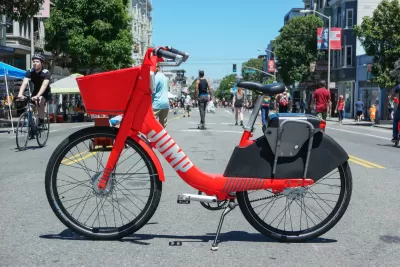Companies are looking to generate profits, but customers have come to expect low-cost, subsidized travel and raising prices will prove challenging.

Alana Semuels reports that shared mobility operators are facing a conundrum: how to start becoming profitable and meet the demands of stakeholders without losing the customers who have become used to cheap travel.
As these companies go public, the venture capital that allowed them to heavily subsidize travel options—by car, bike, and scooter—is disappearing. To turn a profit, they will have to raise prices, says Semuels:
[Sam] Korus, the analyst, thinks that shared scooter companies in particular are in trouble as subsidies come to an end. By his math, it costs scooter companies like Bird $2.55 per mile to rent dockless scooters to customers. Before they raised their prices, these companies were generating just $2.43 in revenue per mile, he says, meaning they will eventually have to raise prices to make money. But as they do, fewer people will use the service.
For some customers, purchasing their own devices is a more cost-effective option. Others will just stop using those services and revert to transportation modes they used before, such as walking or transit. Monthly passes or subscriptions are one strategy companies are considering to hold on to customers, and public subsidies are another possibility.
But the economic viability of shared mobility remains uncertain, says Semuels. "While we’re in an economic expansion at the moment, these companies appear particularly vulnerable to the threat of an economic slowdown. If another recession is coming, as observers like presidential candidate Elizabeth Warren have warned, consumers may be even less willing to pay for rides and other shared services once subsidies disappear."
FULL STORY: 'I'm Back to Riding My Own Bike.' Higher Prices Threaten Silicon Valley’s Mobility Revolution

Planetizen Federal Action Tracker
A weekly monitor of how Trump’s orders and actions are impacting planners and planning in America.

The Simple Legislative Tool Transforming Vacant Downtowns
In California, Michigan and Georgia, an easy win is bringing dollars — and delight — back to city centers.

San Francisco's School District Spent $105M To Build Affordable Housing for Teachers — And That's Just the Beginning
SFUSD joins a growing list of school districts using their land holdings to address housing affordability challenges faced by their own employees.

In More Metros Than You’d Think, Suburbs are Now More Expensive Than the City
If you're moving to the burbs to save on square footage, data shows you should think again.

The States Losing Rural Delivery Rooms at an Alarming Pace
In some states, as few as 9% of rural hospitals still deliver babies. As a result, rising pre-term births, no adequate pre-term care and "harrowing" close calls are a growing reality.

The Small South Asian Republic Going all in on EVs
Thanks to one simple policy change less than five years ago, 65% of new cars in this Himalayan country are now electric.
Urban Design for Planners 1: Software Tools
This six-course series explores essential urban design concepts using open source software and equips planners with the tools they need to participate fully in the urban design process.
Planning for Universal Design
Learn the tools for implementing Universal Design in planning regulations.
Smith Gee Studio
City of Charlotte
City of Camden Redevelopment Agency
City of Astoria
Transportation Research & Education Center (TREC) at Portland State University
US High Speed Rail Association
City of Camden Redevelopment Agency
Municipality of Princeton (NJ)





























